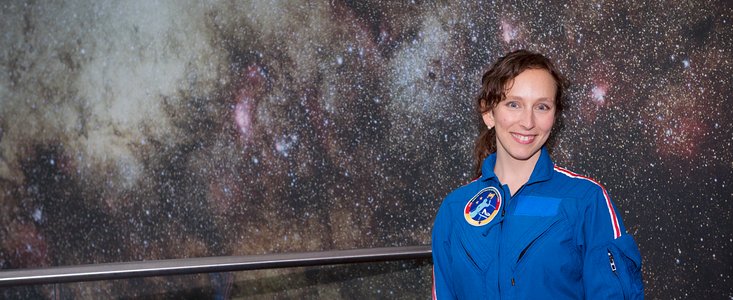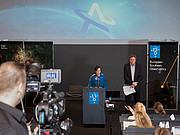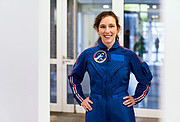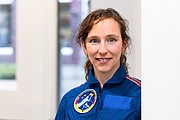Pressemeddelelse
ESO-astronom udvalgt til astronauttræningsprogram
16. februar 2018
ESO-astronom Suzanna Randall er et skridt tættere på sin drøm om at bliver Tysklands første kvindelige astronaut. Hun er udvalgt som ny deltager i træningsprogrammet Astronautin (kvindelig astronaut på tysk), hvis formål det er at optræne den første kvindelige tyske astronaut, og at sende hende på en forskningsmission til den internationale rumstation ISS. Valget er blevet offentliggjort idag ved en pressekonference på ESOs hovedkvarter i Garching i Tyskland.
Initiativet Astronautin startede i 2016 med det formål at inspirere unge kvinder til at vælge job i rumforskningsbranchen, i fysik, i matematik og i tekniske fag, og at sende de første tyske kvinde i rummet. En del af programmet er også at bruge forholdene ombord på ISS til at studere, hvordan kvindekroppen reagerer overfor vægtløshed[1].
Takket være hendes videnskabelige baggrund og talenter indenfor sport, er Suzanna Randall blevet udvalgt som en af to Astronautin kandidater. Hun er født i Köln, er 38 år, og har studeret astronomi i Storbrittannien inden sin PhD eksamen i astrofysik fra University of Montreal i Canada. For tiden arbejder Randall som astronom ved ESO.
Randall startede sin karriere i ESO som ESO Fellow, og arbejder nu indenfor ALMAprojektet. Det er et internationalt partnerskab, som driver Verdens største radioteleskop i den chilenske Atacamaørken. ALMA består af 66 kæmpeantenner, som observerer universet i millimeter- og submillimeterbølgelængder, og det er det mest velegnede astronomiske observatorium til studiet af det kolde og det fjerne Univers[2]. Randall studerer tillige udviklingen for pulserende blå stjerner af den klasse, som kaldes subdwarfstjerner. Hun er også en ivrig paraglider, er yogainstruktør og dyrker vintersport.
Kandidaterne i Astronautin programmet skal lære om omgivelserne og forholdene ombord på ISS. Desuden omfatter programmet også deltagelse i mange andre aktiviteter, og der stilles store krav til kandidaterne, som blandt andet kommer til at deltage i parabolflyvninger, hvor man er vægtløs i korte tidsrum, i overlevelsestræning, flyvning og robottræning.
Randall fortæller, hvad det er, der har motiveret hende til at søge ind i Astronautin-programmet: "Jeg vil gerne vise, at det er muligt for almindelige kvinder at udvikle de kundskaber og evner, som er nødvendige for at blive astronaut, og jeg mener, det er vigtigt, at kvinder deltager på alle niveauer i samfundet. Det bør være helt indlysende, at kvinder også arbejder i rummet."
Igennem de næste to år kommer Randall til at konkurrere om een enkelt rummission med den 34 årige meteorolog Insa Thiele-Eich. I april 2017 blev Thiele-Eich udvalgt til programmet sammen med jagerpiloten Nicola Baumann, ud fra 400 kandidater. Efter at Baumann nu har forladt programmet, besluttede udvælgelseskommiteen enstemmigt at overlade pladsen til Suzanna Randall.
"Vi er glade for, at Suzanna Randall kan springe lige ind i træningsprogrammet på grund af hendes hidtidige træning som astrofysiker," siger Claudia Kessler, som har startet Astronautin-programmet.
Randall og Thiele-Eich modtager støtte under træningen fra firmaet Airbus. Innovationsfirmaet HYVE samarbejder med Astronautin i en udfordrende crowdsourcing kampagne. Tilsammen udvikler de ideer og løsninger, som skal finansiere rummissionen for den første kvindelige tyske astronaut. Selve pressekonferencen har modtaget støtte fra berlinerfirmaet IWG Isolier Wendt GmbH.
Noter
[1] Den internationale rumstation (ISS) er et bemandet forskningslaboratorium i rummet i kredsløb om Jorden, som drives i samarbejde af USA, ESA, Rusland, Japan og Canada. ISS vejer 360 tons, og har mere end 820 kubikmeter opholdsvolumen. Der er plads til en besætning på seks astronauter og til en mængde videnskabeligt forsøgsudstyr. Opbygningen af rumstationen begyndte i 1998.
[2] ALMA har en opløsningsevne, som er ti gange bedre end NASA/ESA Hubble rumteleskopet, og ALMA studerer nogle af de mest spændende forskningsområder i forbindelse med vores kosmiske oprindelse. Det store anlægs gigantiske antenner bliver brugt til at studere oprindelsen for stjerner og planeter, galakser og selve livet. ALMA-observatoriet bruger den mest avancerede teknologi for at nå sine videnskabelige mål i de udfordrende omgivelser i de højtliggende dele af Andesbjergene.
Mere information
ESO er den fremmeste fællesnationale astronomiorganisation i Europa, og verdens langt mest produktive jordbaserede astronomiske observatorium. 16 lande er med i ESO: Belgien, Brazilien, Danmark, Finland, Frankrig, Italien, Nederlandene, Polen, Portugal, Spanien, Sverige, Schweiz, Storbritannien, Tjekkiet, Tyskland og Østrig, og desuden værtsnationen Chile. ESO har et ambitiøst program, som gør det muligt for astronomer at gøre vigtige videnskabelige opdagelser. Programmet har focus på design, konstruktion og drift af stærke jordbaserede observatorier. Desuden har ESO en ledende rolle i formidling og organisering af samarbejde omkring astronomisk forskning. ESO driver tre enestående observatorier i verdensklasse i Chile: La Silla, Paranal og Chajnantor. På Paranal driver ESO VLT, Very Large Telescope, som er verdens mest avancerede observatorium for synligt lys, samt to oversigtsteleskoper. VISTA, som observerer i infrarødt, er verdens største oversigtsteleskop, og VLT Survey Teleskopet er det største teleskop bygget til at overvåge himlen i synligt lys. ESO er en af de største partnere i ALMA, som er det største eksisterende astronomiprojekt. For tiden bygges ELT, et 39 m optisk og nærinfrarødt teleskop på Cerro Armazones, tæt ved Paranal. Det bliver "verdens største himmeløje".
Links
Kontakter
Claudia Kessler
Stiftung erste deutsche Astronautin gGmbH
E-mail: claudia.kessler@dieastronautin.de
Richard Hook
ESO Public Information Officer
Garching bei München, Germany
Tel: +49 89 3200 6655
Mobil: +49 151 1537 3591
E-mail: rhook@eso.org
Ole J. Knudsen (Pressekontakt Danmark)
ESOs formidlingsnetværk
og Aarhus Space Centre, Aarhus Universitet
Aarhus, Danmark
Tel: +45 8715 5597
E-mail: eson-denmark@eso.org
Om pressemeddelelsen
| Pressemeddelelse nr.: | eso1807da |
| Type: | Unspecified : People : Astronaut |
Our use of Cookies
We use cookies that are essential for accessing our websites and using our services. We also use cookies to analyse, measure and improve our websites’ performance, to enable content sharing via social media and to display media content hosted on third-party platforms.
ESO Cookies Policy
The European Organisation for Astronomical Research in the Southern Hemisphere (ESO) is the pre-eminent intergovernmental science and technology organisation in astronomy. It carries out an ambitious programme focused on the design, construction and operation of powerful ground-based observing facilities for astronomy.
This Cookies Policy is intended to provide clarity by outlining the cookies used on the ESO public websites, their functions, the options you have for controlling them, and the ways you can contact us for additional details.
What are cookies?
Cookies are small pieces of data stored on your device by websites you visit. They serve various purposes, such as remembering login credentials and preferences and enhance your browsing experience.
Categories of cookies we use
Essential cookies (always active): These cookies are strictly necessary for the proper functioning of our website. Without these cookies, the website cannot operate correctly, and certain services, such as logging in or accessing secure areas, may not be available; because they are essential for the website’s operation, they cannot be disabled.
Functional Cookies: These cookies enhance your browsing experience by enabling additional features and personalization, such as remembering your preferences and settings. While not strictly necessary for the website to function, they improve usability and convenience; these cookies are only placed if you provide your consent.
Analytics cookies: These cookies collect information about how visitors interact with our website, such as which pages are visited most often and how users navigate the site. This data helps us improve website performance, optimize content, and enhance the user experience; these cookies are only placed if you provide your consent. We use the following analytics cookies.
Matomo Cookies:
This website uses Matomo (formerly Piwik), an open source software which enables the statistical analysis of website visits. Matomo uses cookies (text files) which are saved on your computer and which allow us to analyze how you use our website. The website user information generated by the cookies will only be saved on the servers of our IT Department. We use this information to analyze www.eso.org visits and to prepare reports on website activities. These data will not be disclosed to third parties.
On behalf of ESO, Matomo will use this information for the purpose of evaluating your use of the website, compiling reports on website activity and providing other services relating to website activity and internet usage.
Matomo cookies settings:
Additional Third-party cookies on ESO websites: some of our pages display content from external providers, e.g. YouTube.
Such third-party services are outside of ESO control and may, at any time, change their terms of service, use of cookies, etc.
YouTube: Some videos on the ESO website are embedded from ESO’s official YouTube channel. We have enabled YouTube’s privacy-enhanced mode, meaning that no cookies are set unless the user actively clicks on the video to play it. Additionally, in this mode, YouTube does not store any personally identifiable cookie data for embedded video playbacks. For more details, please refer to YouTube’s embedding videos information page.
Cookies can also be classified based on the following elements.
Regarding the domain, there are:
- First-party cookies, set by the website you are currently visiting. They are stored by the same domain that you are browsing and are used to enhance your experience on that site;
- Third-party cookies, set by a domain other than the one you are currently visiting.
As for their duration, cookies can be:
- Browser-session cookies, which are deleted when the user closes the browser;
- Stored cookies, which stay on the user's device for a predetermined period of time.
How to manage cookies
Cookie settings: You can modify your cookie choices for the ESO webpages at any time by clicking on the link Cookie settings at the bottom of any page.
In your browser: If you wish to delete cookies or instruct your browser to delete or block cookies by default, please visit the help pages of your browser:
Please be aware that if you delete or decline cookies, certain functionalities of our website may be not be available and your browsing experience may be affected.
You can set most browsers to prevent any cookies being placed on your device, but you may then have to manually adjust some preferences every time you visit a site/page. And some services and functionalities may not work properly at all (e.g. profile logging-in, shop check out).
Updates to the ESO Cookies Policy
The ESO Cookies Policy may be subject to future updates, which will be made available on this page.
Additional information
For any queries related to cookies, please contact: pdprATesoDOTorg.
As ESO public webpages are managed by our Department of Communication, your questions will be dealt with the support of the said Department.






